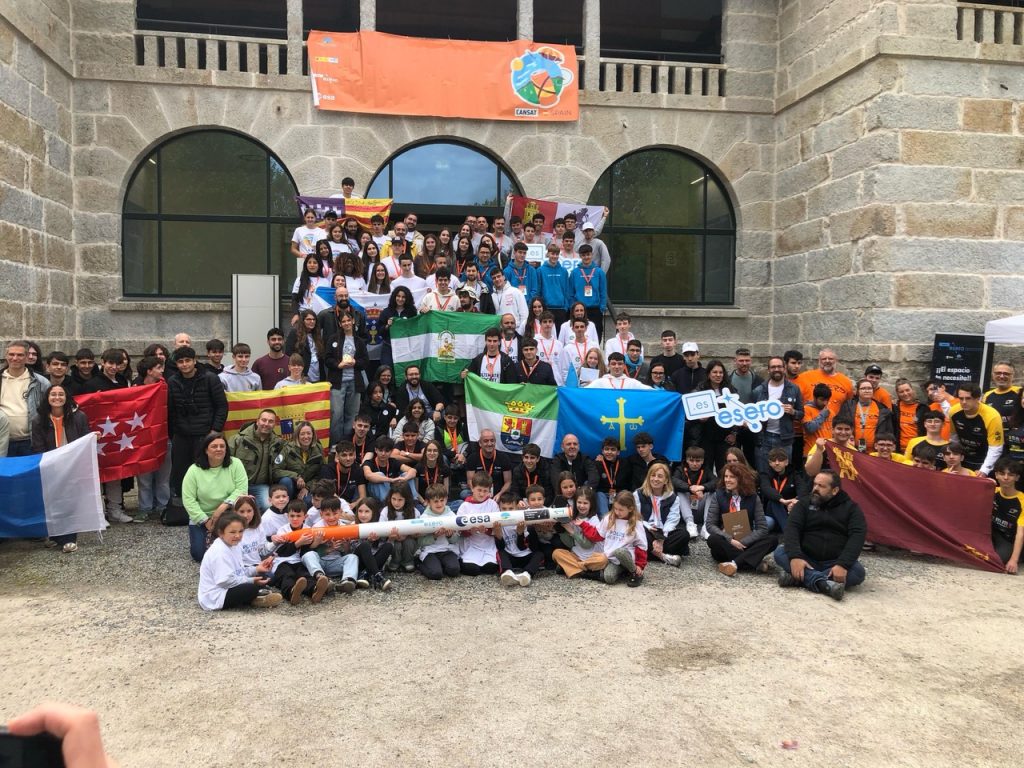
Heading to Space from Ourense: Students Launch Satellites with the Support of the European Space Agency
- Cristina Rodríguez, researcher at the IAA-CSIC, participated as a jury member in the national final of the CanSat challenge, where secondary school students built and launched satellites the size of a soda can.
- Cristina Rodríguez is currently working at CITIC at the University of A Coruña (UDC) as part of the team of the AIRExS associated unit of the IAA-CSIC.
A Coruña, May 26, 2025.– The Research Centre in Information and Communication Technologies (CITIC) at the University of A Coruña recently took part in the national final of the 2025 CanSat challenge, held on May 13 and 14 in Ourense. This is an educational initiative organized by the European Space Agency’s (ESA) Education Resource Office (ESERO Spain), which challenges secondary school students to build and launch a functional satellite the size of a soda can.
The event brought together teams from 16 autonomous communities, who launched their satellites on rockets to an altitude of over 600 meters from the Ourense Integrated Wildfire Control Center. These satellites, equipped with pressure, temperature, and altitude sensors, also carried out secondary scientific missions designed by the students themselves, addressing current issues such as environmental pollution, fire detection, or the analysis of atmospheric pollen.
Representing CITIC, Cristina Rodríguez López, researcher at the Institute of Astrophysics of Andalusia (IAA-CSIC) and member of the CSIC-associated unit AIRExS, served as a jury member alongside Enrique Costa Montenegro, professor at the School of Telecommunication Engineering at the University of Vigo; Emma Janeiro Torres, secondary school teacher at the Instituto República Oriental del Uruguay in Vigo; and Gemma Rojo López, PhD in Civil Engineering from CITEEC at the University of A Coruña.
The jury highlighted the extremely high technical quality, creativity, and commitment demonstrated by the teams, emphasizing the importance of fostering STEM vocations from an early age.
The scientific missions designed by the teams covered topics such as environmental pollution, the search for new antibiotics, fire detection, search and rescue, measurement of the magnetic field and UV radiation, or the assessment of pest risks using AI techniques.
The winning mission, presented by the team «ZephySat» from Andalusia, focuses on the analysis of pollen particle stratification in the lower atmosphere, which is later analyzed by an AI application developed by the team. The winning team will travel in June to ESA’s European Space Research and Technology Centre (ESTEC) in Noordwijk (Netherlands), where they will participate in the “Space Engineer for a Day” event, experiencing a typical workday of an ESA engineer and having the opportunity to present their project before a panel of experts.
Initiatives such as the CanSat challenge aim to spark scientific and technological vocations among young people, promoting active learning, teamwork, and critical thinking through a project with both international scope and professional orientation.
About the AIRExS Unit
The major technological challenge of discovering exoplanets and developing new methods for their detection and analysis is one of the frontier areas in current astrophysics. CITIC at the University of A Coruña and the CSIC, through the Institute of Astrophysics of Andalusia (IAA-CSIC), have joined forces to promote research and innovation in this field through the unit “AIRExS: Artificial Intelligence for Research on Exoplanets and Stars” at the University of A Coruña, which has recently been granted the status of associated R&D&I unit of the CSIC for a three-year period. This is a strategic collaboration that strengthens the UDC’s research capacity by integrating it into the CSIC’s scientific excellence network.
The unit is led by Minia Manteiga and also includes other researchers from the UDC’s ICT Research Centre such as José Carlos Dafonte, Manuel González Penedo, and Eduardo Mosqueira, along with research support staff. On behalf of the IAA-CSIC, the lead is Galician astrophysicist Cristina Rodríguez López.
About CITIC
CITIC is a research center that promotes progress and excellence in R&D&I applied to ICTs. It was founded in 2008 by the University of A Coruña. The center’s scientific activity is structured into four main research areas: Artificial Intelligence; Data Science and Engineering; High-Performance Computing; and Intelligent Services and Networks. There is also a cross-disciplinary research area: Cybersecurity.
CITIC is accredited as a Center of Excellence and member of the CIGUS Network for the 2024–2027 period. The accreditation, structuring, and improvement of CITIC are co-financed by the Xunta de Galicia and 60% by the European Union under the Galicia ERDF Operational Program 2021–2027, within the thematic objective of promoting “a smarter Europe: innovative and smart economic transformation” (ED431G 2023/01).





